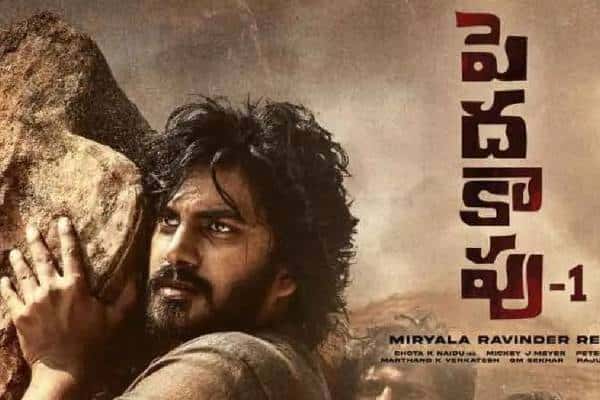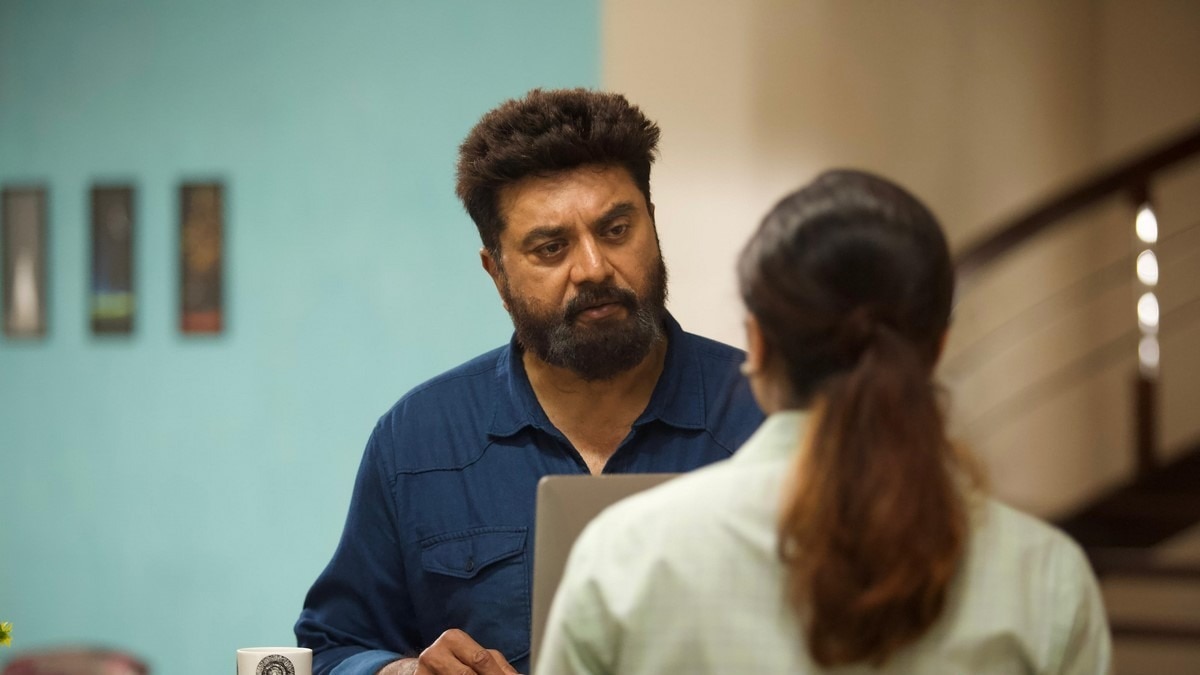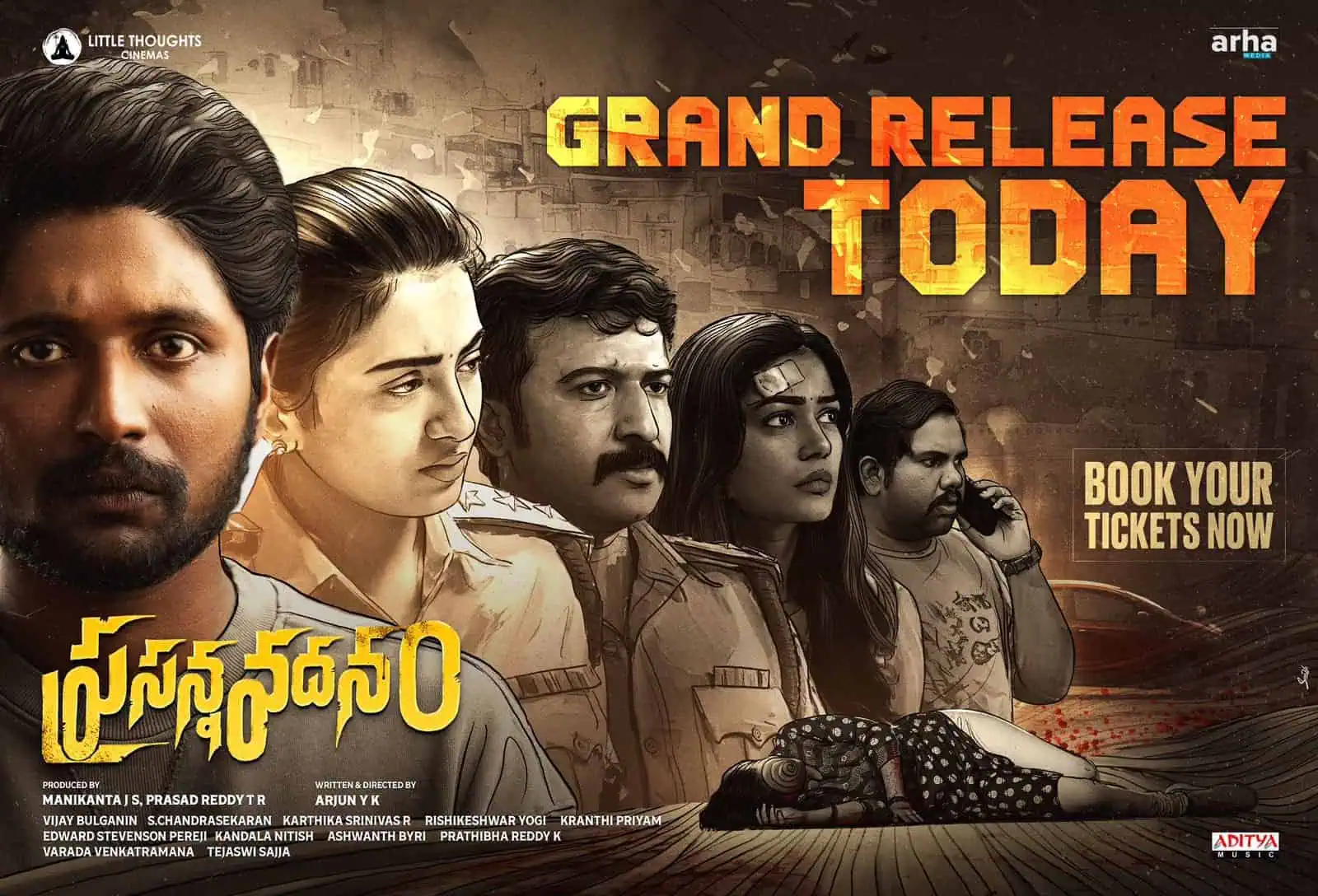Movie Reviews
Movie Review: Pedda Kapu -1 – Gulte

2/5
2 Hr 29 Mins | Action Rural | 29-09-2023
Cast – Virat Karrna, Pragathi Shrivatsav, Rao Ramesh, Naga Babu, Anasuya
Director – Srikanth Addala
Producer – Miryala Ravinder Reddy
Banner – Dwaraka Creations
Music – Mickey J Meyer
Post Brahmotsavam debacle, director Srikanth Addala shifts to bold and rustic content. His previous one was Narappa (Asuran remake) with Venkatesh. Now, he comes up with Pedda Kapu that marks the launch of Virat Karrna as the male lead. Will Srikanth score success and cement his position?
Plot
Set in 1980s in a fictional village near Rajahmundry where caste politics and family feuds rule, Peddha Kapu (Virat Karrna) fights against oppression in the village by two power centres – Satya Rangayya (Rao Ramesh) and Bhaiyanna (Aadukalam Naren). How things drastically changed after NT Ramarao starts political party in 1982. How Peddha Kapu settles all the scores by taking on mighty Satya Rangayya and Bhaiyanna is the story. Who is Akkamma (Anasuya) and how is she involved?
Performances
Debutante Virat Karna has made a decent performance. He scored points in action scenes, while he underscored in emotional scenes. Rao Ramesh is best-suited for the role of a crooked villain and selfish politician set in rural milieu. His mannerisms and behaviour create an aura. Pragati Srivastava plays a rural belle and she pulls it off well. She was abandoned by her parents which gives emotional depth. But she is jovial and extroverted. Her character has a twist to the story. Barring this, she doesn’t have much scope to perform. Tanikella Bharani is seen as a drunkard who is vexed with caste and opportunistic politics. He is presented as a person who cares for society and the village. Naga Babu is seen as party incharge. His character is largely involved in bringing Satya Rangayya and Bhaiyyana together to create peace in the village. Anasuya as Akkamma has got a meaty role. There was a lot of hype around her role. But it didn’t translate as expected. Her character couldn’t leave the desired impact. As a villain, Srikanth Addala leaves half-impact. Rajeev Kanakala and Easwari play the parents of Pedda Kapu. They have nothing much to add value to the story. Overall, some performances are over-played and some are too subtle. This uneven in the cast’s performances confuses the viewers.
Technicalities
Pedda Kapu sounds and looks quite ambitious, thanks to visuals, production design and the scale of the film involving large canvas and huge crowd in camera frames. But this suffers with its writing. Director banks on cinematography, background music technically. Songs have failed miserably. Mickey J Meyer couldn’t do the magic. After listening to songs, Mickey was the wrong choice for this genre. The slow-paced narration is yet another shortcoming.
Highlights
Visuals
Rural Set-Up & BGM
Drawbacks
Brutal Violence
Stretched Out Drama
Disconnecting Emotion
Slow & Predictable Narration
Songs
Analysis
Rangasthalam, a film set in rural backdrop involving caste politics, turned the Tollywood’s landscape. Allu Arjun’s Pushpa is also the rise of a common man against all the odds in rural setting. The blockbuster result of these films gave huge breather to big-budget rural backdrop movies. Nani travelled the same path with Dasara (again village domination politics and rustic backdrop) and yet again scored success. Even films like Palsa and Uppena has lower-caste and oppression as the core-elements in their plots. And Telugu Cinema has quite familiar with this lower-caste and self-respect theme. Director Srikanth Addala is a late entrant who catches the trend a bit late. After remaking Narappa, Srikanth seems to have believed there is still room to explore this genre.
With Pedda Kapu, Srikanth largely banks upon bold content. He chose raw and rustic content. There was no supporting base (story) to add weight to the raw, rustic content. On top of it, director has gone overboard. The violence is what drives Pedda Kapu with scenes of head-chopping. Blood and gory was all over. All this indicate Pedda Kapu is intentionally a bold attempt. The film has got large canvas, big scale with prominent cast, technicians. But it couldn’t work.
‘Meeku Ante Vunte, Maaku Entha Vandali’, this dialogue sums up the Peddha Kapu’s plight. The first half is decent and promises to be somewhat intense. The interval scene was spine-chilling and gives some high. But the second-half of the film nosedives, leaving audience disappointed. There is a twist as well involving Akkamma (Anasuya). But this twist and following consequences didn’t pan out as it was intended. After Akkamma, the film turns out to be predictable. The climax portions are not engaging. The whole story is narrated in confusing way. The drama has been stretched out without the engaging scenes and without depth. It is only build-up and elevation with BGM. There was no supporting base. Pedda Kapu might be ambitious and intended to become a big film, but it falters marginally in terms of narration. For debutante Virat Karna it is not the end of the world and it is a decent start, for Srikanth Addala, Pedda Kapu is certainly a blow.
Verdict: Addala’s ‘Mass’ter Stroke!
Rating: 2/5
Tags Pedda Kapu

Movie Reviews
Sonic the Hedgehog 3 (2024) – Movie Review

Sonic the Hedgehog 3, 2024.
Directed by Jeff Fowler.
Starring Ben Schwartz, Jim Carrey, Keanu Reeves, Idris Elba, Colleen O’Shaughnessey, Krysten Ritter, James Marsden, Tika Sumpter, Alyla Browne, Lee Majdoub, Natasha Rothwell, Shemar Moore, Adam Pally, Tom Butler, James Wolk, Jorma Taccone, Cristo Fernández, and Sofia Pernas.
SYNOPSIS:
Sonic, Knuckles, and Tails reunite against a powerful new adversary, Shadow, a mysterious villain with powers unlike anything they have faced before. With their abilities outmatched, Team Sonic must seek out an unlikely alliance.

Watching Sonic the Hedgehog 3 is a vindicating experience. For years (possibly decades by now), whether it be the first two Sonic the Hedgehog movies, Bayformers, and plenty of other examples that exist out there, there has always been a firm feeling among many that if these filmmakers and studios forced aside the damn human characters and focused on who viewers are here to see (which doesn’t mean crowded, embarrassing fan service), the results would likely be worthwhile.
This might be the first live-action/CGI hybrid feature of its kind that almost entirely does away with its already established human characters (discounting staples of the game people actually want to see, such as Jim Carrey’s returning Dr. Robotnik, once again with ample screen time) and trust that there is enough compelling story within the source material to adapt sincerely that fans and nonfans alike will come away satisfied.

Granted, in the case of Sonic the Hedgehog, director Jeff Fowler (who has directed all three of these firms) didn’t have much to work with since the Sega Genesis games weren’t necessarily known for story or characterization (as the games branched out into different gameplay mechanics and evolved with the industry’s technology, so came attempts at telling stories within them), somewhat forced to bring human characters into a cinematic adaptation. However, over the previous two films, he and screenwriters Pat Casey, Josh Miller, and John Whittington have gradually and gracefully brought in more nonhuman characters to join forces with the lightning-fast Sonic (voiced by a returning Ben Schwartz), such as tech gadget specialist fox Tails (voiced by Colleen O’Shaughnessey) and brawling, literal-minded Echidna warrior Knuckles (another amusing voiceover performance from Idris Elba.)
This installment brings Shadow the Hedgehog into the mix, bursting with chaos energy and hell-bent on revenge-fueled destruction. Toss in a long-lost grandfather Robotnik (also played by Jim Carrey, opening up an entire separate dimension for his reliably impressive brand of physical comedy and strange noises), and the filmmakers now have enough characters to where the likable but also intrusive human additions can be pushed off into the background, making an appearance for cameo purposes or when it actually fits the story being told. Despite that, some human cameos don’t need to be here, aren’t funny, and feel contractually obligated more than anything. For the most part, though, everything is much more tolerable and sensible.

Aside from the prologue, when Sonic’s human best friend Tom (James Marsden) and his partner Maddie (Tika Sumpter) pop up, it’s not solely for jokes but typically to push forward a specific central theme regarding loved ones, dealing with anger, and important choices in life that directly correlate to with what Shadow (voiced by Keanu Reeves in John Wick mode, which is pleasantly fitting for the character) is going through.
Having been contained and studied for roughly 50 years upon being discovered in a meteorite crash, Shadow has escaped and is obsessed with bringing forth chaos and ensuring others feel his pain. Such torment movingly plays out in flashbacks, revealing that while he was frequently experimented on, Commander Walters’ daughter Maria (Furiosa‘s Alyla Browne, already a notable effusive presence from these two movies alone) occasionally broke him out to play and developed a close bond. She became the only bright spot in his experience on Earth, meaning that one doesn’t have to be a rocket scientist to figure out that something tragic eventually happened.

It appears that whoever is cooperating with Shadow is also utilizing whatever is left of Dr. Robotnik’s technological weapons. The mad scientist turns out to still be alive and has put on a few pounds (although not quite as heavy as the character’s depiction in the video games, but considering there are more movies to come, one presumes he might not be done gaining weight) while watching Spanish soap operas and chilling with his loyal minion Agent Stone (Lee Majdoub.) Enemies decide to join forces to discover who is behind the commotion temporarily. Agent Stone realizes that Sonic and company aren’t just a team but also friends, a dynamic he wishes he could have with Dr. Robotnik. As previously mentioned, Dr. Robotnik discovers that his grandfather (just as diabolically insane and intelligent) is alive, paving the way for another familial dynamic and some nutty off-the-wall chemistry between two Jim Carreys.
And while there are unquestionably brief stretches of horrendously delivered dramatic dialogue from supporting characters and cringe gags (dancing across a hallway filled with lasers), there is a moving-through line of heroes and villains forced to look within themselves and determine who they ultimately want to be, especially as betrayals occur. Perhaps most importantly, it leads to impressively staged action that is epic in scale, showcasing Sonic and Shadow beating each other senseless across the entire planet and into outer space, amplified by genuinely emotional stakes regarding love and loss.

With Sonic the Hedgehog 3, Jeff Fowler and company have found the right balance of humor (even Jim Carrey feels reinvigorated and energized more than in the first two, up for the goofy acting challenge presented that is right inside his slapstick wheelhouse, while also simply given mostly funnier material to work with) and frenzied action elevated by strong, vibrant CGI (this is unquestionably one of the better-looking special-effects extravaganzas of recent memory) alongside an engaging story. There is a case to be made that Shadow’s back story could have been even longer and not limited to a couple of flashbacks, but the right characters here are put front and center, which makes all the difference for a Sonic adaptation to click.
Sonic the Hedgehog 3 is aware it doesn’t always “gotta go fast,” occasionally slowing down to ensure we care about these characters while laying out its themes with affecting sincerity.
Flickering Myth Rating – Film: ★ ★ ★ / Movie: ★ ★ ★
Robert Kojder is a member of the Chicago Film Critics Association and the Critics Choice Association. He is also the Flickering Myth Reviews Editor. Check here for new reviews, follow my Twitter or Letterboxd, or email me at MetalGearSolid719@gmail.com
https://www.youtube.com/watch?v=embed/playlist
Movie Reviews
The Smile Man review: Sarath Kumar's film fails to realise its full potential

A serial killer on the loose. The killer has a pattern – he/she brutally maims the target, leaving them with a gory smiling face. Enter a high-ranking police officer diagnosed with Alzheimer’s, who has only one year before his memory fades forever. Now, this is a story that has the potential to be developed into a high-octane thriller with twists and turns. But, does Sarath Kumar’s 150th film, The Smile Man, live up to expectations? Let’s find out!
Chidambaram Nedumaran (Sarath Kumar), a CBCID officer, is recuperating from an injury. To make matters worse, he’s been diagnosed with Alzheimer’s and has just one year left to preserve his memories. Before his injury, he was involved in the investigation of The Smile Man case. While he is trying to adapt to his new lifestyle with memory loss, a series of similar killings take place, forcing Chidambaram to reopen the case.
This time, however, Chidambaram must battle his declining health while investigating the case to unmask the killer. Why was the Smile Man case closed before his injury? Is there anything more than what meets the eye? Who is the killer, and what is their motive?
Director duo Syam and Praveen’s The Smile Man has a solid story at its core, though it might remind you of thrillers, Ratsasan and Por Thozhil. A serial killer story has a predictable template, but a film can stand out from the crowd because of the way the story and screenplay are treated. That way, The Smile Man is an illogical thriller that reeks of amateur making. The killer leaves a smiling scarred face on the victims and the pattern should ideally shock the audience. But, the poor prosthetic makeup hardly makes it look menacing.
Here’s the trailer:
The portrayal of journalists in The Smile Man is poor, anf the dialogue is one of the film’s biggest drawbacks. For example, the CBCID officer casually throws around words like ‘copycat killer’ without any solid basis. The reasons given are so futile that it forces you to not take the characters seriously.
The killer’s face is hidden for half of the film, and when it is eventually revealed, it fails to deliver any excitement. Similarly, the killer’s motive and his backstory are told and not shown. The justification hardly makes sense and one could spot a lot of logical loopholes.
TThe film’s music tries to evoke emotions but falls flat. Before each murder, a growl indicates what’s coming, and before the killer strikes, the music warns you. This removes the element of surprise, which is crucial to a good thriller.
Sarath Kumar is the only actor who gives his all in an attempt to salvage this poorly executed story. The rest of the performances, except for those by George Maryan and Kalaiyarasan, make little impact.
The Smile Man is a lost opportunity considering the potential it showed. If only the screenplay had been handled better, the film could have had a much stronger impact.
2 out of 5 stars for The Smile Man.
Movie Reviews
Movie Review: “Mufasa,” everything we didn’t need to know about “The Lion King”

The CGI animated savannahs, rivers and rock formations of Africa are photo-real, and the animals populating it have never been more realistically rendered than they are in “Mufasa: The Lion King.”
Disney felt the need to have the lions, warthog and meercat’s lips move when they sing, which is saying something.
But let’s keep this review short and not-exactly-sweet, unlike this boardroom-ordered prequel to one of Disney’s most popular intellectual properties. “Mufasa: The Lion King” never makes the case that it’s a story that needed to be told or a movie that needed to be made.
It’s about how Mufasa got separated from his birth-parents’ pride of lions, and joined another, becoming “brothers” with the lion cub who “saved” him, but who will come to be called “Scar.”
So the object of this prequel is to show how Mufasa became Lion King and how Scar got his scar and became the bitter rival in their pride.
The “story” is framed as a “story” Rafiki the ape (John Sani) tells Simba’s cub, and that cub’s protectors/babysitters, Timon (Billy Eichner) and Pumbaa (Seth Rogen).
The tale is of another coming-of-age quest, with two young-lions on their own this time, paired-up, depending on each other, on the run from a pride of albino lions led by the killer Kiros (Mads Mikkelsen).
There are new songs of a far more forgettable nature than those from the animated classic “The Lion King.”
“The circle is broken,” he growls, and we believe him.
There are harrowing moments of drama in their quest, but there’s precious little humor to the movie, all of it provided by the same duo who have always been the comic relief, Timon and Pumbaa.
“We’ve been singing ‘Hakuna Matata’ since forever!”
“Who hasn’t?“
The messaging, about taking in “strays,” and that “To be lost is to learn the way,” is weak tea.
Story failings aside, it’s not a bad movie. But “Mufasa” never lets us forget the limited-entertainment-value of the entire undertaking. Oscar winner Barry Jenkins (“Moonlight”) was hired to direct, but aside from a few voice casting decisions (Keith David, Anika Noni Rose, with Aaron Pierre and Kelvin Harrison, Jr. as Mufasa and Taka/Scar), he brings nothing to this that makes a difference.
Disney’s tech/animators telling their bosses that “Yes, we can make it look like a movie with real singing lions and bathing hippos on the veldt without using real animals or shooting on location” is no justification for showcasing that technology.
Story matters, and this one didn’t need to be told.

Rating: PG, some violence
Cast: The voices of Aaron Pierre, Kelvin Harrison, Jr., Tiffany Boone, John Kani, Mads Mikkelsen, Thandiwe Newton, Keith David, Billy Eichner and Seth Rogen.
Credits: Directed by Barry Jenkins, scripted by Jeff Nathanson, based on characters from Disney’s “The Lion King.” A Walt Disney release.
Running time: 1:58
-
/cdn.vox-cdn.com/uploads/chorus_asset/file/24924653/236780_Google_AntiTrust_Trial_Custom_Art_CVirginia__0003_1.png)
/cdn.vox-cdn.com/uploads/chorus_asset/file/24924653/236780_Google_AntiTrust_Trial_Custom_Art_CVirginia__0003_1.png) Technology6 days ago
Technology6 days agoGoogle’s counteroffer to the government trying to break it up is unbundling Android apps
-

 News1 week ago
News1 week agoNovo Nordisk shares tumble as weight-loss drug trial data disappoints
-

 Politics1 week ago
Politics1 week agoIllegal immigrant sexually abused child in the U.S. after being removed from the country five times
-

 Entertainment1 week ago
Entertainment1 week ago'It's a little holiday gift': Inside the Weeknd's free Santa Monica show for his biggest fans
-

 Lifestyle1 week ago
Lifestyle1 week agoThink you can't dance? Get up and try these tips in our comic. We dare you!
-
/cdn.vox-cdn.com/uploads/chorus_asset/file/25672934/Metaphor_Key_Art_Horizontal.png)
/cdn.vox-cdn.com/uploads/chorus_asset/file/25672934/Metaphor_Key_Art_Horizontal.png) Technology3 days ago
Technology3 days agoThere’s a reason Metaphor: ReFantanzio’s battle music sounds as cool as it does
-

 Technology1 week ago
Technology1 week agoFox News AI Newsletter: OpenAI responds to Elon Musk's lawsuit
-

 News4 days ago
News4 days agoFrance’s new premier selects Eric Lombard as finance minister


















